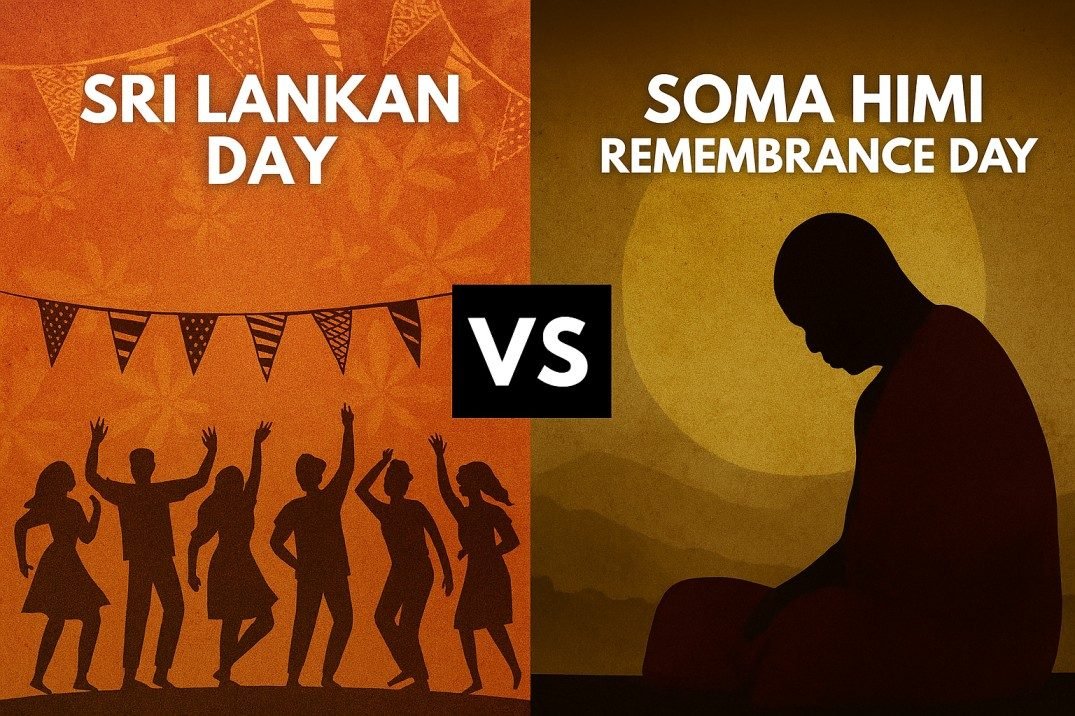The Cabinet’s decision to declare December 12 as “Sri Lankan Day” is presented as a multicultural festival of parades, food fairs, and exhibitions. At the administrative level, this is framed as reconciliation, a symbolic gesture of unity across communities. Yet beneath the surface, it reveals the government’s reliance on ideological theatre rather than genuine policy. Instead of strengthening sovereignty or addressing the people’s real needs, the state machinery is mobilized to produce a spectacle that consumes mahajana mudal — public funds.
For the people, December 12 is already sacred. It is the day Ven. Gangodawila Soma Thero passed away in 2003. Though never declared by presidential proclamation, it has become a day of dharmic native remembrance. Communities across the nation continue to honor Soma Himi as an authentic national mentor, whose fearless voice challenged corruption and reminded the Army of its true duty. Soma Himi words in shorts— “Hamudawa inne rata rakkina, despalakayan rakkin nowe” (The army exists to protect the country, not to protect politicians) — remain etched in the conscience of the nation. They motivated soldiers to see themselves as guardians of sovereignty, not tools of political power. By imposing “Sri Lankan Day” on this date, the government buries that moral strength under a carnival of weakness.
The government claims this festival will promote unity. But unity cannot be staged with banners and parades. True unity is moral, not theatrical. It arises from shared truth, not forced multicultural shows. A carnival on a day of Remembrance divides rather than reconciles. Communities see this as political manipulation, not reconciliation. Sovereignty too is weakened. Real sovereignty was defined on May 22, 1972, when Sri Lanka became a Republic. Declaring new “days” without civilizational meaning dilutes national identity. “Sri Lankan Day” risks becoming another tool to bury truth under spectacle, eroding the people’s sense of who they are.
Dr. Sudath Gunasekara has long cautioned against multiplying “celebrating days.” He insists that sovereignty is defined by May 22, 1972 — not by artificial festivals. His critique exposes the administrative weakness of “Sri Lankan Day”: it dilutes sovereignty by creating meaningless commemorations. Buddhika Polpitiya calls “Sri Lankan Day” a manipulation of public memory, warning that government leadership is attempting to domesticate Sinhala tradition under the guise of multiculturalism. He demands December 12 remain a Day of Remembrance for Ven. Soma Himi, not a carnival. Their arguments converge on a single point: the government’s administrative decision undermines both unity and sovereignty by trampling native remembrance.
The Daily Mirror report describes exhibitions, food fairs, and four entertainment zones. In my view, this reveals the emptiness of the program, since it offers spectacle but no meaningful remembrance. It notes that the Ministry of Buddhasasana, Religious and Cultural Affairs will stage the event across Colombo Municipal Council Grounds and Vihara Maha Devi Park, divided into four zones with participation from public and private organizations. But large venues and zones do not create cultural depth; they create distraction. True culture is lived in villages, temples, and homes not staged in municipal grounds. Exhibitions of industries and food stalls are commerce, not culture. They enliven markets, not minds. High cultural intelligence means knowing where we live, respecting native traditions, and protecting civilizational continuity. A carnival of consumption will not strengthen identity; it will weaken it.
This program is not about unity. It is about burying native remembrance under political ideology. December 12 is already sacred as the day of Ven. Soma Himi an authentic national mentor whose words gave moral strength to the Army and the people. Turning this day into a carnival wastes mahajana mudal the people’s money while eroding sovereignty and tradition. The claim of “celebrating diversity” is hollow if it comes at the cost of erasing native foundations. Diversity must be lived with respect, not staged with banners.

The passing of the late Ven. Gangodawila Soma Thero in December 2003, under circumstances in Russia that remain shrouded in mystery, continues to weigh heavily on the conscience of the nation. For the people of Sri Lanka, and especially for those who were close to him, the unanswered questions surrounding his demise are not merely personal sorrow but a collective wound. We may choose the path of forgiveness, but we cannot allow ourselves to forget. The purpose of writing this is to let our readers know that we may forgive but will never forget this crime against the Buddha Sasana.
As author, I am writing this to remind our entire Sinhala Buddhist nation: if you truly believe in the Triple Gem, then know this we may choose the path of forgiveness, but we will never forget. The passing of Ven. Gangodawila Soma Thero remains a wound in our collective conscience, and it stands as a crime against the Buddha Sasana. To forget would be to betray both our faith and our civilizational duty.
By Palitha Ariyarathna
”මෙම ලිපිය අවසන් කිරීමට පෙර, පූජ්ය ගංගොඩවිල සෝම ස්වාමීන්වහන්සේගේ අවසාන දේශනය අසා බලන්න…”
“Do not end this article without hearing the final sermon of Ven. Gangodawila Soma Thero — a voice that still echoes through the conscience of our nation.”
“The final sermon of Ven. Gangodawila Soma Thero, delivered shortly before his passing in December 2003 — a message that continues to resonate deeply with the Sinhala Buddhist nation.”

